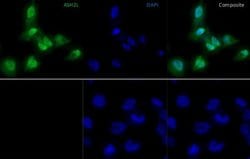Learn More
Invitrogen™ ASH2L Monoclonal Antibody (AS 4C5), eBioscience™, Invitrogen™
Rat Monoclonal Antibody
Supplier: Invitrogen™ 14506937

Description
This AS 4C5 monoclonal antibody recognizes human ASH2L, which has been described as a transcriptional regulator and may play a role in hematopoiesis. AS 4C5 detects full length (unspliced) and reduced ASH2L by Western Blot and stains ASH2L in the nucleoplasm and at the plasma membrane in Immunocytochemistry. ASH2L monoclonal antibody (AS 4C5) has been validated for the following applications: Western Blot and Immunocytochemistry; AS 4C5 does not cross react with mouse ASH2L. Applications Reported: This AS 4C5 antibody has been reported for use in Western Blot and Immunocytochemistry. Applications Tested: This AS 4C5 antibody has been tested by western blot using whole cell lysates of HeLa cells (human) and NIH 3T3 or N2a (mouse cell lines) and by immunocytochemistry on HeLa cells. This AS 4C5 antibody may be used at 2 μg/mL for western blot and at 1.25 μg/mL for immunocytochemistry.
The human ASH2L gene encodes a 628 amino acid protein known as ASH2L1, or isoform 1, which contains a nuclear localization signal and PHD finger motif, suggesting that the gene product functions as a transcription regulator. Its predicted molecular weight is 68.7kDa. Alternative splicing results in possible isoforms at 60 kDa & 56.5 kDa). Human ASH2L proteins are 60% homologous to Drosophila ash2, which positively regulates expression of certain genes in early development, and contain similar, but not identical, domains, including a zinc finger motif. Homology to mouse ASH2L is 90%. ASH2L is predominantly expressed in adult heart and testis and fetal lung and liver, with barely detectable expression in adult lung, liver, kidney, prostate, and peripheral leukocytes as well as leukemia cell lines with erythroid and megakaryocytic potential, such as K562, Hel and Dami. Differentiation inducers (e.g. phorbol ester and hemin) cause different expression patterns in these cell lines, suggesting that ASH2L plays a role in hematopoiesis and is associated with particular types of leukemia. In addition ASH2L has been suggested to interact with beta-tubulin and beta-catenin.
Specifications
| ASH2L | |
| Monoclonal | |
| 0.5 mg/mL | |
| PBS with 0.09% sodium azide; pH 7.2 | |
| Q9UBL3 | |
| ASH2L | |
| Purified | |
| RUO | |
| 9070 | |
| 4°C, do not freeze | |
| Liquid |
| Western Blot, Immunocytochemistry | |
| AS 4C5 | |
| Unconjugated | |
| ASH2L | |
| ASH 2; ASH2; ash2 (absent, small, or homeotic)-like; ash2 (absent, small, or homeotic)-like (Drosophila); ASH2 LIKE; ASH2 like histone lysine methyltransferase complex subunit; ASH2 like protein; ASH2 like, histone lysine methyltransferase complex subunit; Ash2l; ASH2L1; ASH2L2; ash2-like; ASH2-like protein; Bre 2; Bre2; set1/Ash2 histone methyltransferase complex subunit ASH2 | |
| Rat | |
| 2 mg | |
| Primary | |
| Human | |
| Antibody | |
| IgG2a κ |
Safety and Handling
The Fisher Scientific Encompass Program offers items which are not part of our distribution portfolio. These products typically do not have pictures or detailed descriptions. However, we are committed to improving your shopping experience. Please use the form below to provide feedback related to the content on this product.
